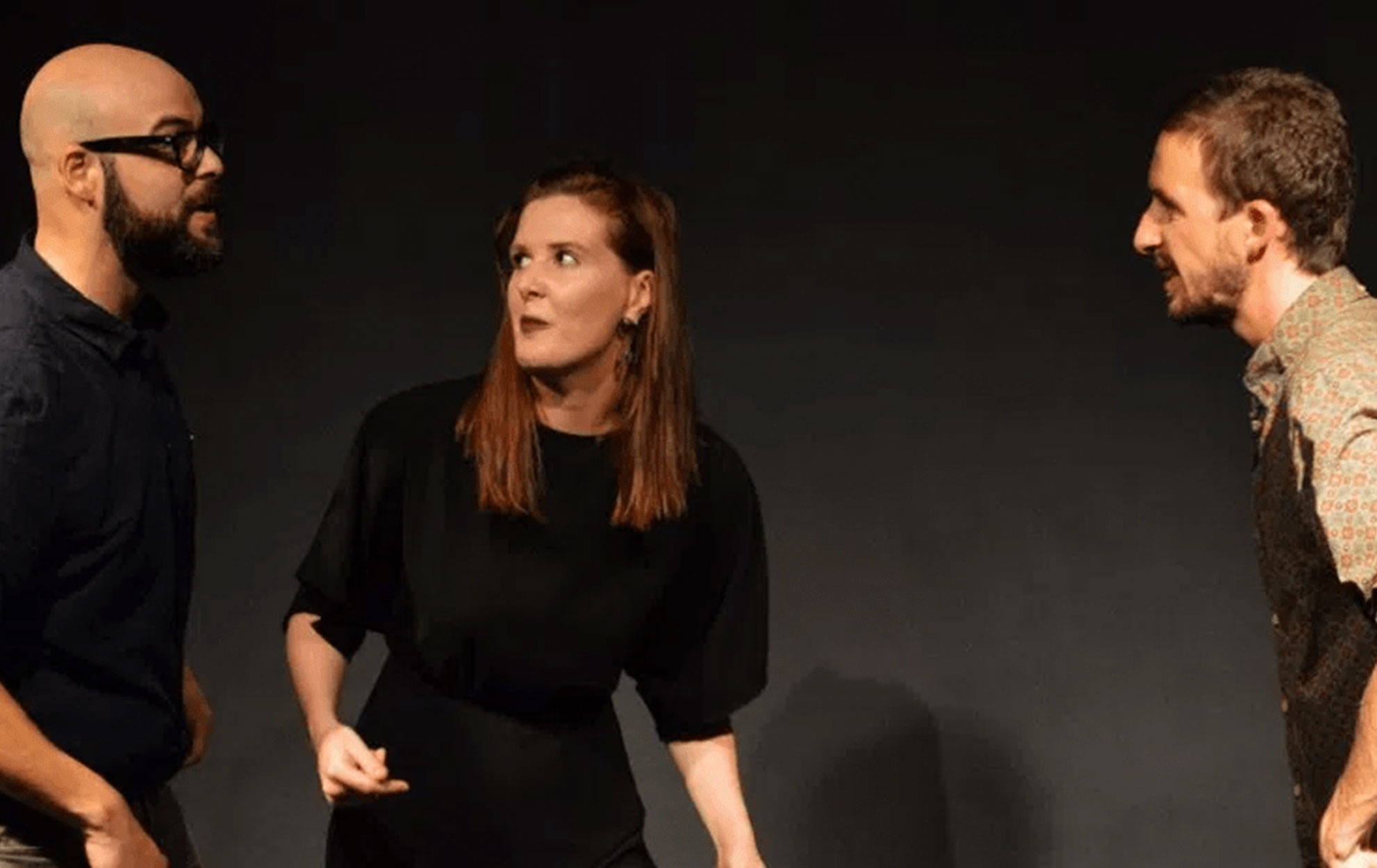by Barbara Barron | Posted March 7th, 2018
Let’s set the scene, shall we?
You and your co-solicitor, the Head of School, are preparing to meet with a new family. The plan, which you two have previously agreed on, is that at a certain point during the campus tour, you’re going to ask them for a leadership gift for an ongoing capital campaign.
You’ve both researched this family, as you always do, so you’re confident that your ask range is reasonable. (It’s bold, as well, because shouldn’t it always be?) And since you don’t know them well yet, you’re — well — you’re nervous, aren’t you?
Of course you are. This is a big moment. The trepidation is palpable.

The family arrives. You trip a little over your greeting. You hesitate to shake hands because you don’t want them to feel your sweaty palms. You defer to your Head of School, who gives you a look like, “What the hell is going on?” and the tour begins.
Suddenly you’re in your own head. You’re marching towards The Big Ask, but instead of being calm and cool and in the moment, you’re chewing on the shame of having screwed up that crucial first moment. You’re on the defensive, trying to do two things at once: answer questions but also undo the damage you’ve already done.
And by the time you get to The Big Ask, well — you can imagine.
In fact, you may be feeling a slight burning in your cheeks right now. Because this has happened to you, hasn’t it?
It has happened to all of us.
Frankly, it amazes me how many times we find ourselves in this exact situation and, despite having crashed and burned more times than we care to count, we continue to just… wing it.
My dear friend and former boss, Jay Goulart, would often ask during training sessions: “When was the last time you saw a play that made you laugh, cry, or touched your heart? What are the chances those actors decided to just wing it!?”
Point taken, Jay. Just because we’re not professional actors, doesn’t mean we aren’t performers. And if we can accept the fact that we are performers, then we can hold ourselves to the standard of performers.
What do performers do? They prepare. They rehearse.
“But Barbara, it’s different,” I hear you saying. “Actors have a script.”
That’s true, reader. But not all actors have a script.
My son Danny, and my son-in-law Chris, are both studio-trained improv performers. If you’ve never had the pleasure of seeing an improv show, I highly recommend you treat yourself. I can’t guarantee that it will always be, well, good. But that’s actually beside the point.
What improv comedians are doing every night they perform is taking that ugly, crappy feeling of anxious trepidation and transforming it into something productive.
So how do they do it? Good question.

Rule #1 – Agree to Listen
Every item on this checklist is about agreeing on something.
But you can’t agree on something if you don’t all get in a room for two minutes before the big show. So let me make this clear from the get-go: in order to incorporate these tips into your workflow, you will need to check in with your team before every single donor encounter. If only to keep these rules fresh in your minds.
Okay, great. Knowing that, we can focus on our first tip – which may, in fact, be the hardest.
We all know the old adage that “the person talking isn’t learning anything.” It’s true. We focus so much on what we’re going to say that we forget that 99.9% of what we should be doing is listening, and reacting.
I’ll say that again: your job is to listen. Then react.
If you aren’t listening, your donor will notice. Just like you notice when you say something to someone and they say something that has nothing to do with what you just said.
And it’s not just about listening to them. It’s about listening to everyone: your co-solicitor, your team, the teacher whose classroom you’ve dropped in on. It’s about being all ears, all the time.
If you’re doing this right, you’ll find yourself naturally asking your visitors questions. The whole endeavor will feel more like a conversation than a speech. Listen to their answers. Really listen. Allow them to share what’s important to them, and then adjust your next move based on what they say. Ask another question, then another.
You’ll be amazed how much pressure is relieved when you realize that 99.9% of what you and your team need to do is simply receive.

Rule #2 – Agree to Agree
In improv comedy, the number one rule is “Say yes, and…”
That rule should apply to your team as well.
Everyone on site should know that nothing good comes of correcting or contradicting. From the moment your “pre-show” meeting ends, all of your team members are to act as as a singular unit – a school of fish, if you will.
And everything that comes out of your co-solicitor’s mouth will be absolute genius.
Does this mean that you have to actually agree with the muddy factoid about enrollment your team member just tossed out on the fly? No, of course not.
But it does mean that you will go along with it in the scene, and then check in after to see where they got that interesting little (wrong) tidbit.
When everyone agrees to agree, you’ll notice that the tenor of your conversation feels far more positive than usual. No one is fact checking, or trying to be the smartest in the room. Everyone is treating everyone else like revered professionals. It’s contagious!
Your donors will notice, and it’ll put them at ease. I guarantee it.

Rule #3 – Agree to Stay on Subject
Here’s where things get a little more complicated…
Let’s say you and your team are successfully agreeing to agree and agreeing to listen. Wonderful. You’re already miles ahead of the competition.
But the flip side of creating this kind of culture is that oftentimes our agreeing can guide us away from our purpose. In other words, by allowing our guests to speak more than we do, and by treating everyone like the geniuses they are, we can sometimes spiral into a twenty-minute conversation about our favorite television shows, or worse – politics.
It is imperative that someone – I’m looking at you, my genius reader – agrees to be the person who will guide the conversation back to the matter at hand.
And what is the matter at hand? The school and it’s mighty mission, of course. No matter how many strange turns our conversation takes, all roads must lead back to the opportunity for someone to make a difference in the life of your students and faculty.

Rule #4 – Agree to Stay in Character
So now we’ve achieved the fabled groupthink, with you as the fearless leader who will keep our school fishies on their mission… what next?
Now we take things to the next level.
Each team member should volunteer, or be deputized, to touch upon topics on which they are experts. Perform a quick rundown on the major issues: enrollment, sports, arts, culture, you name it, and make sure that one team member feels responsible for each issue. And then, as the group leader, you will answer anything not covered by those topics.
Why is this important? Because it means each solicitor doesn’t have to keep in her head the entirety of your organization. Instead, she can have her own areas of expertise — a character, if you will, that she can embody during the run of the show.

Rule #5 – Agree to Have Fun
This isn’t one of the written rules of improv, but anyone who has ever experienced a sidesplittingly funny improv show knows that when the performers are having fun, odds are the audience is sharing in that fun, as well.
The same is true for you. If you and your team are giving off the vibes that this is the least favorite part of your jobs, you better believe your “audience” is going to pick up on that.
Have you subscribed to the newsletter yet? It only takes a minute.
So agree on this: we, as a team, are going to allow ourselves to feel the joy of this moment. Not the moment it’s over. Not the moment the check comes in. Ok, that too! But this moment. Right here, right now. As a client and I agreed the other day: getting the meeting is a success in and of itself. It is an absolute honor to have the opportunity to chat with people who love our school and want to share their resources with us. Feeling and appreciating this may well be the key to our long-term success as fundraising professionals.
And that’s it.
These five tips, when followed, will absolutely transform the tenor of these high-stakes interactions.
Can I promise that you’ll be free from anxiety? No, of course not. But, remember, it’s not about zero anxiety. Anxiety is the byproduct of playing the game. What we’re trying to do here is prepare ourselves to transform that energy into something productive and helpful.
So try it out. And let me know – via social media – how things go. I’m genuinely curious. If you want to dive deeper or have a peculiar curveball that this post doesn’t take into account, give me a call. We can roleplay together to get your asking muscles in shape, your script sharp, and your confidence high.
And I wasn’t kidding before about seeing an improv comedy show. I guarantee that someone near you is doing it, and it’s never expensive to attend. See for yourself what it takes to bring down the house, and come up with your own rules!
My name is Barbara Barron, and I’m writing this blog to share advice on a profession that I adore.
I’ve been working in the field of Independent School Advancement for nearly 20 years. In that time, I’ve had the pleasure of creating and implementing successful Strategic Fundraising Plans for so many incredible schools. I’ve had the privilege of seeing real growth at The Carey School, Marin Primary & Middle School, Woodside Priory, Crystal Springs, Presidio Knolls and others. (Maybe we’ve met!)
Nothing makes me happier than seeing a struggling school start to thrive. My hope is that you’re here to make a positive change as well. I hope my advice can be a part of that change.
Shoot me an e-mail if you want to swap tips, or share your voice here.
Let’s do this, together.



